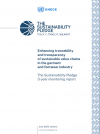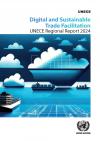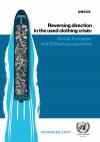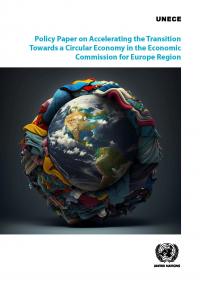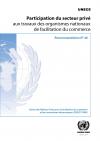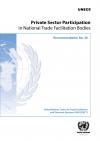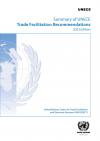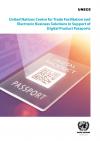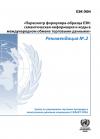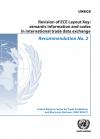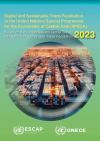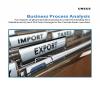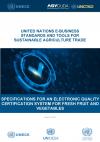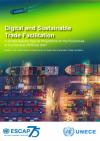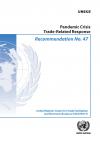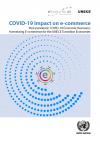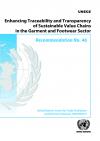Publications
Displaying Results 1 - 20 of 93
- English
“The Sustainability Pledge 3-year monitoring report” presents the results of monitoring activities conducted in the context of the United Nations Economic
Commission for Europe (UNECE)’s Call to Action, the Sustainability Pledge1. The Call to Action was launched in 2021 under the initiative “Enhancing transparency and traceability for more sustainable value chains in the garment and footwear
- English
The fifth United Nations Global Survey on Digital and Sustainable Trade Facilitation, jointly conducted by the five United Nations Regional Commissions and UNCTAD, offers an in-depth and comparative analysis of the implementation of 60 trade facilitation measures in over 160 countries worldwide in 2023. Aside from measures in the WTO TFA, the survey covers the implementation of cutting-edge
- English
The textile industry has evolved from a production model based on natural fibres and protectionist policies for local industry to a model where synthetic fibres have become pervasive, production has been offshored, and the speed of manufacture and distribution of products has increased rapidly. Most of the fashion industry operates under the fast-fashion model, which involves more collections per
- English
This policy paper reviews the state of play of traceability and transparency approaches in three economic sectors critical to the circular transition in the ECE region: the agrifood, garment and footwear, and minerals sectors. Moreover, it provides an overview of the challenges and opportunities for advancing the circular economy and highlights successful practices from the whole region. Lastly,
- Français
L’objet de la présente recommandation est de sensibiliser les pouvoirs publics à la nécessité de faire participer activement le secteur privé aux travaux des organismes nationaux de facilitation du commerce (ONFC) afin de rendre ces derniers plus pertinents, plus légitimes et plus performants. Dans la Recommandation no 4 de la Commission économique pour l’Europe (CEE), initialement approuvée en
- English
The purpose of this recommendation 48 (ECE/TRADE/479) is to communicate to governments how important the active engagement of the private sector is in national trade facilitation bodies (NTFBs) for strengthening their relevance, legitimacy and performance. The United Nations Economic Commission for Europe (ECE) Recommendation No. 4, originally approved in 1975 and revised in 2015, stressed that
- Pусский
Цель данной рекомендации состоит в том, чтобы довести до сведения правительств, насколько важным является активное участие частного сектора в работе национальных органов по упрощению процедур торговли (НОУТ) в целях повышения их значимости, легитимности и эффективности. В Рекомендации Европейской экономической комиссии Организации Объединенных Наций (ЕЭК) № 4, первоначально утвержденной в 1975
- English
This publication (ECE/TRADE/475) provides the following information on each recommendation:
Brief description
Equivalent ISO standard number (where appropriate)
Current status, indicating whether the recommendation is under development, approved or under revision
Dates and publication numbers of documents containing the first approved and last revised versions of the recommendation
Indication and
- English
Digital tools can play an important role in accelerating the shift to a circular economy. Digital tools can increase transparency along value chains and provide information, which in turn can help to extend the lifecycle of products.
Digital Product Passports (DPPs), for example, can inform consumers and businesses about products, materials, the conditions under which they are produced and their
- Pусский
Рекомендация № 2 Европейской экономической комиссии (ЕЭК) Организации Объединенных Наций была первоначально утверждена одновременно с Рекомендацией № 1 ЕЭК «Формуляр-образец Организации Объединенных Наций для внешнеторговых документов», чтобы подчеркнуть важность четкого определения используемой в документах информации и рекомендовать применение перечней кодов, когда это возможно. Позднее она
- Français
La Recommandation no 2 de la Commission économique pour l’Europe (CEE) a été initialement approuvée en même temps que la Recommandation no 1 intitulée « Formule-cadre des Nations Unies pour les documents commerciaux » afin de souligner qu’il importait d’arrêter une définition univoque des informations figurant dans les documents et de recommander l’utilisation de listes de codes dans la mesure du
- English
United Nations Economic Commission for Europe (ECE) Recommendation No. 2 was originally approved at the same time as ECE Recommendation No. 1: United Nations Layout Key for Trade Documents to underline the importance of unambiguous definition of the information in documents and to recommend the use of code lists to the extent possible. It was later integrated into the United Nations Layout Key
- English
This report is part of a global survey effort on the implementation of trade facilitation and paperless trade measures, undertaken jointly by the five United Nations Regional Commissions for Africa (ECA), Europe (ECE), Asia and the Pacific (ESCAP), Latin America and the Caribbean (ECLAC) and West Asia (ESCWA) as well as the United Nations Conference on Trade and Development (UNCTAD).
This report
- English
The report provides an overview of the general trade and regulatory context of Georgia and an analysis of the key economic figures of the pharmaceutical sector, such as industry composition and dynamics, and exports. It gives an overview of the country’s transport networks and presents key facts of the sector and identifies possible bottlenecks in and proposes solutions for the trade-related
- English
This document presents the eQuality Certification system processes and business requirements for Fresh Fruit and Vegetables covered by marketing standards. It provides a high level functional description of the main business processes to be managed by an electronic Conformity Certificate management system for Fresh Fruit and vegetables . This functional system specification can be used as a
- English
The report presents results of the 2021 United Nations Global Survey on Digital and Sustainable Trade Facilitation for six participants in United Nations Special Programme for the Economies of Central Asia (SPECA), namely Afghanistan, Azerbaijan, Kazakhstan, Kyrgyzstan, Tajikistan and Uzbekistan, reviewing the progress of trade facilitation reforms and provides a detailed analysis based on 58
- English
Recommendation 47 outlines measures to mitigate the adverse impact of a pandemic such as COVID-19 on trade flows. Such pandemics have revealed the challenges of facing a health crisis and its impact on society and economies which could potentially leave lasting scars on the global economy.
Download:
- English
Transportation demand is forecasted to triple by 2050. Keeping track of that intensification of transportation is imperative for all supply chain stakeholders. Motivated by factors such as operational efficiency standards, competitive pressures, heightened customer expectations and governmental regulations, both public and private organizations are searching for mechanisms to reduce risks by
- English
The COVID-19 pandemic has sunk the global economy into the deepest recession in decades and continues to take an unprecedented toll on human health and life. In an effort to contain and prevent the spread of the disease, governments across the globe, imposed restrictions on movement. Border closures and partial or full lockdowns became the new normal in many parts of the world. The pandemic and
- English
Improving traceability and transparency has become a priority for the garment and footwear industry. Consumers, governments, and civil society are demanding responsible business conduct and are calling upon the industry to identify and address actual and potential negative impacts in the areas of human rights, the environment, and human health.
By creating enhanced visibility in value chains,


